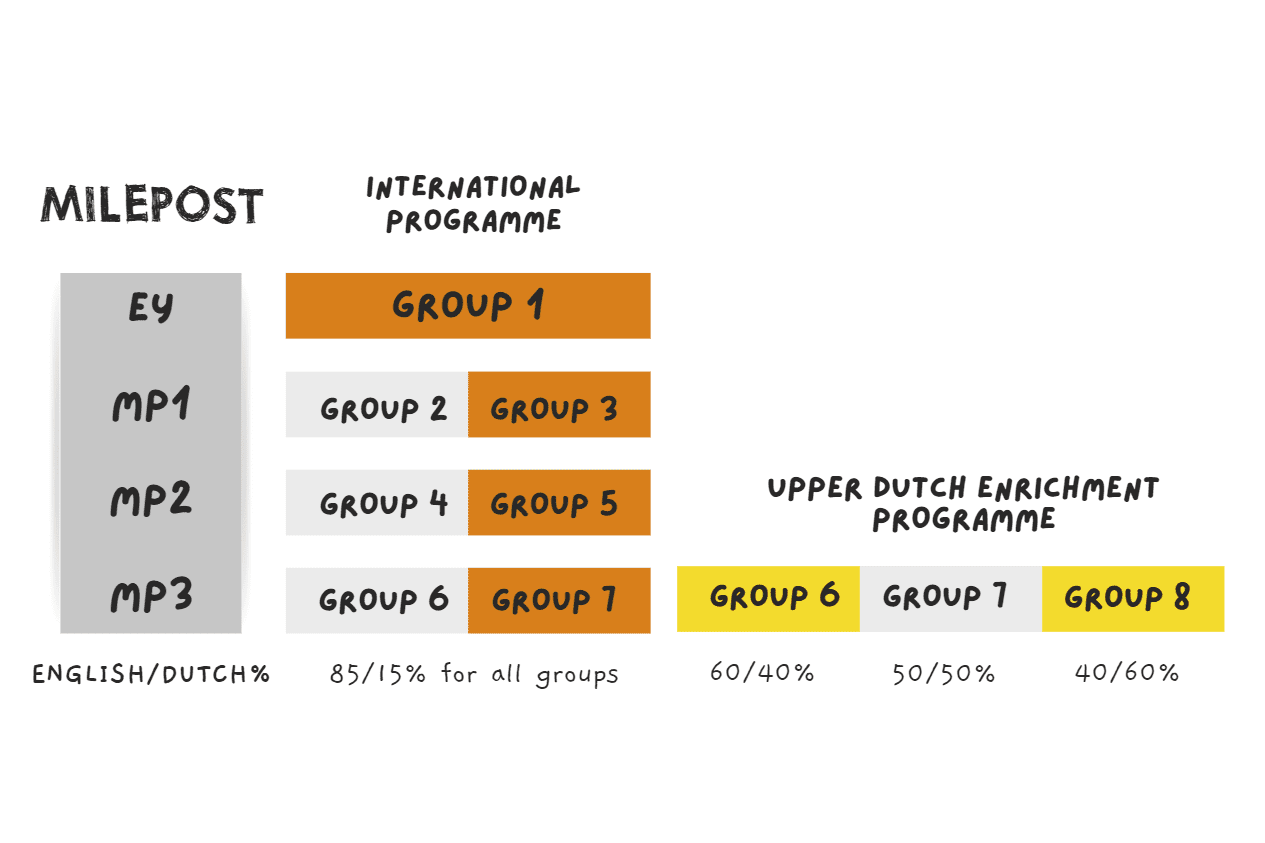Dutch Enrichment Programme (DEP)

EMPOWERING STUDENTS FOR A SEAMLESS TRANSITION INTO DUTCH SOCIETY AND EDUCATION
Recognizing the diverse paths our students may take, especially those seeking to integrate further into Dutch society, we offer the Dutch Enrichment Programme (DEP) in our upper primary, as an optional pathway.
This programme is designed for students who wish to enhance their academic Dutch proficiency while continuing to benefit from our international curriculum.
The DEP aims to provide a smoother transition to secondary education in the Netherlands, offering a unique Dutch language learning experience that opens doors to future opportunities.
In summary OIS offers two programmes which can be considered as two learning pathways:
- the International Programme running from group 1 – 7. This prepares for international secondary education starting at the age of 11. Most learning is in English and approximately 15% in Dutch to allow students to integrate in Dutch society
- the Dutch Enrichment Programme (DEP), an alternative additional programme for our upper primary running from group 6 – 8. This prepares for secondary education in the Netherlands starting at the age of 12. Learning is in English and Dutch, gradually more Dutch is added with an academic focus
KEY FEATURES OF THE DEP
- Academic Dutch Proficiency: Academic and Dutch language conventions are taught explicitly to enable the students to become more proficient in their understanding and use of the language, setting a strong foundation for success in Dutch secondary education and beyond.
- Tailored Curriculum: Integrating age-appropriate International Primary Curriculum units with focused Dutch language studies, ensuring students are challenged academically and prepared for future educational endeavours.
- Progressive Language Immersion: Classes are taught in both English and in Dutch, with the language of Dutch increasing, tackling more complex aspects of the language as the child continues throughout the programme.
- Enhanced Cognitive and Social Skills: Students will have opportunities to further develop executive functions, essential mental skills for secondary education and beyond. They help students to plan, focus, juggle multiple tasks, stay focused on a task, develop healthy habits, social relationships and self-esteem.
- Supportive Learning Environment: With small class sizes and personalized attention, we meet each student’s learning needs, promoting confidence and excellence.
- Experienced multilingual learning specialists: Led by experienced multilingual learning specialists dedicated to nurturing Dutch language proficiency and ensuring a language friendly supportive learning environment.
WHY CHOOSE THE DEP?
Choosing for the DEP, at Optimist International School, offers your child a chance to thrive academically and culturally within the Dutch setting, alongside the advantages of an international education framework. This program is well-suited for families planning to stay in the Netherlands longer-term and considering future Dutch education, or who wish to equip their children with advanced multilingual skills.

FLEXIBILITY AND CHOICE
At OIS, we value the importance of choice, offering families the option to select between our enriching International Programme and the specialised DEP. Our commitment lies in supporting every student’s journey towards academic achievement, cultural integration, and personal growth.
Frequently asked questions
Explore our FAQs below for insights into the DEP. For more details about the programme, selection criteria, and secondary transition processes, please refer to our comprehensive guide by clicking the FAQ button below.
From which group does the DEP start
- The DEP is offered to students in Groups 6, 7 and 8. In Groups 1 – 5 we are laying a foundation with an offer of approximately 15% of lesson time spent on Dutch language learning. In all Groups 1 – 5 and Groups 6 – 7 of the international programme the focus will be on oral language, social language and some academic language.
Will the international programme for mobile families still exist?
- OIS will still offer the school’s international programme in Groups 6 and 7. The DEP is an extra option
- We advise families who are in the Netherlands for a short period of time to follow the international programme as this prepares students in the best way possible for further international education abroad
- The international programme also offers Dutch language lessons and lessons/activities in Dutch, mainly focused on oral language, social language and some academic language, to allow students to integrate in Dutch society.
How many children will there be per year group of the DEP
- Our teaching is always done in small groups which allows us to be adaptive and tailor to the needs of all children. As an international school with parents paying a fee, we can realise this, and this also enables us to have extra specialists in schools and extra support in classes by teaching assistants
- Our maximum class size is 22, as per our school policy we may temporarily increase that slightly in which case we assign more teaching staff to the group.
What is the most important factor of success of the DEP?
- Running a DEP programme demands multilingual expertise and expertise in second language teaching, which requires a different approach than general language learning. It also requires strong didactical skills of teachers. Teachers must be flexible and thoughtful about learning and what language fits best for that learning. It also requires an adaptation of both the international and Dutch curriculum,
- Looking at the composition of the team of Optimist International School, the quality and expertise we have in multilingualism and its didactics, the experience and habit of developing our own learning concepts based on a learning continuum, we believe to be successful.
Will there be aims for the DEP programme regarding the level of Dutch proficiency?
- Yes, part of the development of the learning continuum also includes defining specific aims and choosing assessments to determine Dutch proficiency. The aims of Dutch language proficiency will be aligned with the Common European Framework of Reference for Languages (CEFR), a widely accepted guideline used to describe achievements of learners of foreign languages across Europe.
- The CEFR divides language proficiency into six levels, which are grouped into three broad divisions: Basic User (A1 and A2), Independent User (B1 and B2), and Proficient User (C1 and C2). Haarlemmermeer Lyceum also works with the CEFR framework. Within this framework the areas Speaking, Listening, Reading and Writing are distinguished.
- We will determine individual aims per child, based on a start assessment that we will administer before they start the DEP. Regular assessment and adjustment of goals are crucial to meeting the educational needs of the students effectively.
How is Dutch taught and which curriculum is used?
- Through Dutch language lessons, students engage with the grammar, vocabulary, and pronunciation fundamentals of the Dutch in a structured environment in speaking, listening, reading and writing. We will use Dutch schemes and assessments for that. Beyond these language-specific lessons, we incorporate immersive activities and lessons conducted in the Dutch to provide an academic context in Dutch. For this we will mainly use our existing curriculum as a starting point, such as IPC.
Which subjects will be done in Dutch?
- The DEP curriculum content is comprised of the existing OIS international curriculum subjects such as IPC, Mathematics, Language arts, PSHE, PE. Gradually all subjects will be taught in Dutch over three years; in Group 8 in one year.
- With IPC in Dutch, we will focus on language and vocabulary needed at secondary as we know there are some heavy language subjects there such as History and Biology. Additionally, we will offer a subject focused on study skills, planning, managing tasks, as a preparation for secondary education.
What other subjects will be taught in the DEP?
- Students will have opportunities to further develop executive functions, essential mental skills for secondary education and beyond. They help students to plan, focus, juggle multiple tasks, stay focused on a task, develop healthy habits, social relationships and self-esteem.
When do we need to decide for our child to enrol in the DEP?
- This depends on when your child starts at Optimist International School. The DEP programme starts in Upper Primary Group 6. For new families joining our school both international program and DEP will be discussed as part of the admission process
- When families in Group 5 re-enrol for a Group 6 place in the following academic year, they will be given the option to enrol for the DEP or our International Programme, opening doors to diverse opportunities
